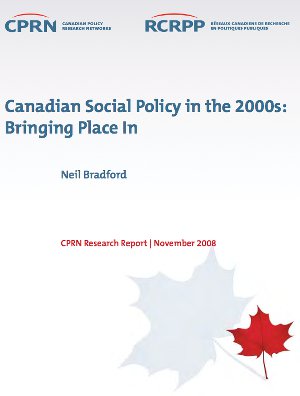Organization:
Canadian Policy Research Networks
This article explores departures in Canadian public policy toward more “place-based” approaches to social development.Focusing on the federal government, it describes a series of recent initiatives designed to enable local actors to participate in policy development processes and take greater control of their own destinies. Using the categories of “municipal empowerment” and “community building” to map new patterns, the article examines innovation and learning across federal and local scales. The article concludes that Canadian governments have now joined a robust and evolving international conversation about leveraging local assets to meet significant national policy challenges, but that more work needs to be done to build high performing, durable multi-level partnerships.
Download the research report
Contents
Abstract
1. Introduction
2. New Ideas: Policies for People in Places
3. New Ideas in Action: A Canadian Perspective
3.1 Policy Innovation
3.1.1 Devolution (1): Community Building
3.1.2. Devolution (2): Municipal Empowering
3.1.3 Bridging Initiatives: Empowering and Building
3.2 Social Learning
3.2.1 Community Building
3.2.2 Municipal Empowering
3.2.3 Bridging Initiatives: Empowering and Building
4. Moving Forward
References
Tables
Table 1. Two Public Policy Frameworks
Table 2. Place-Based Policy in Canada: An Illustrative Federal Policy Inventory
Year:
2009
Format:
Research report
Categories:
Government
Policy Development & Advocacy
Source:
Weblink
Org
Theme:
